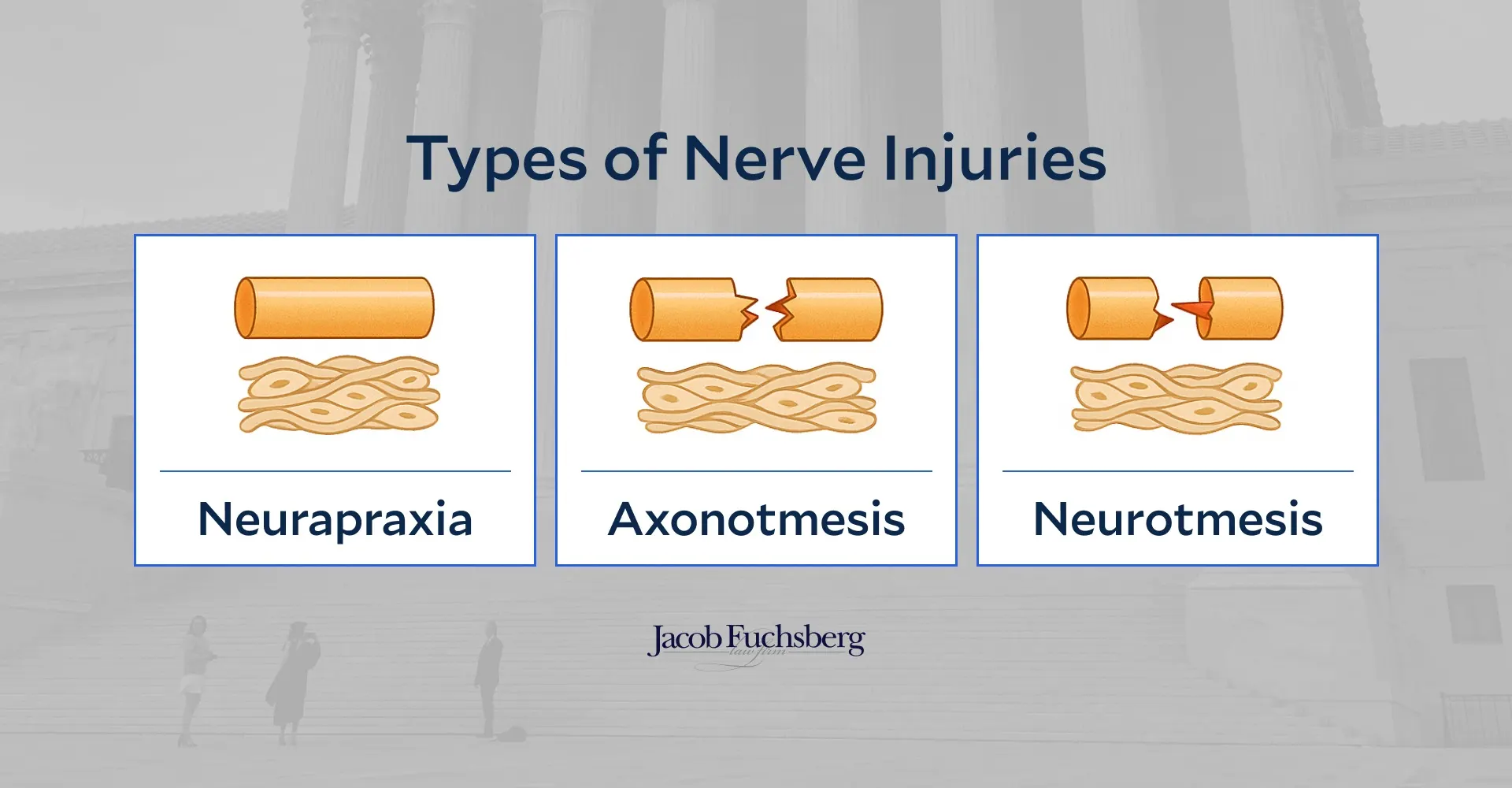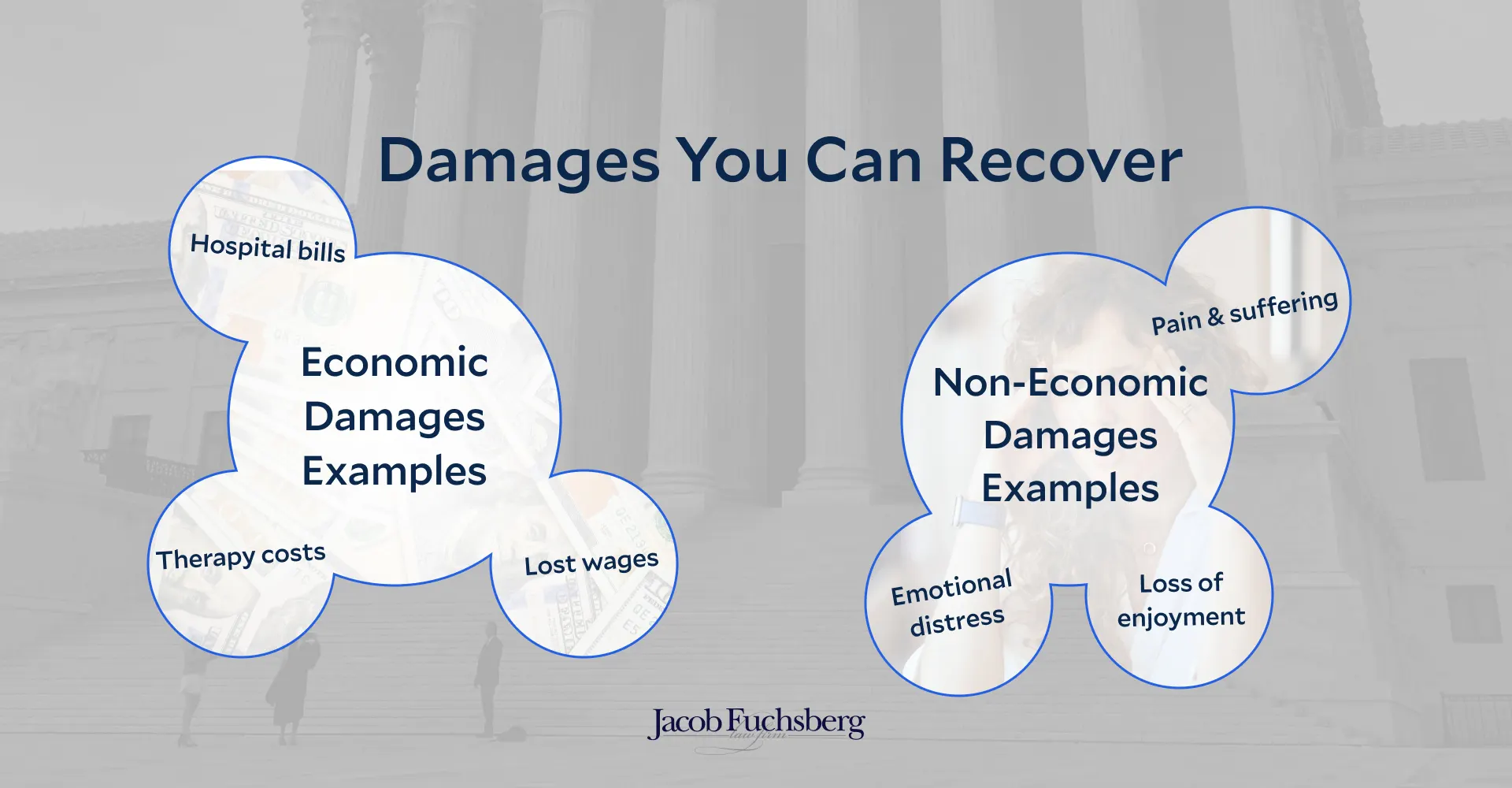- Loading...
Yes, you can sue for nerve damage after surgery, but only if the injury was caused by medical negligence. While some nerve damage is a known risk of surgery, not all cases are unavoidable. If a surgeon makes a preventable error that leads to serious, lasting harm, you may have grounds for a medical malpractice lawsuit.
Understanding the medical and legal aspects of these cases is critical. If you are uncertain about your rights, our New York surgical errors attorney can review your situation and explain your legal options.
What Is Nerve Damage?
Nerves act as the body’s communication network, carrying messages between the brain, spinal cord, and muscles. When a nerve is damaged during surgery, it can interfere with those signals and lead to a wide range of complications.
Types of Nerve Damage
Not all nerve injuries are the same. Some are temporary and improve with rest and therapy, while others can leave lasting or permanent disability. Doctors categorize surgical nerve damage into three main types:

- Neurapraxia: The mildest form, often caused by stretching or compression of a nerve. Symptoms may include tingling, numbness, or weakness, and recovery can take weeks or months.
- Axonotmesis: This involves damage to the nerve fibers themselves, leading to more serious functional loss. Recovery may take months or years, and some effects may remain permanent.
- Neurotmesis: The most severe form, occurring when a nerve is completely severed. This usually results in permanent loss of sensation or movement in the affected area, even with treatment.
The consequences can be life-altering, ranging from chronic pain and loss of mobility to difficulty performing daily tasks or even paralysis.
How Does Nerve Damage Happen During Surgery?
While some risk of nerve injury exists in nearly all surgical procedures, many cases of nerve damage could and should be avoided. Common causes include:
- Surgical mistakes such as cutting, stretching, or compressing a nerve.
- Poor patient positioning during surgery can result in a nerve being compressed for hours during a lengthy procedure.
- Improper use of surgical tools or retractors creating unnecessary pressure on delicate nerve structures.
- Failure to map nerve locations before cutting in high-risk areas like the spine, shoulder, or face.
- Post-surgical complications, such as excessive bleeding, swelling, or infection that compresses nerves.
Certain operations are particularly risky for nerve damage. For example, spinal surgeries can injure nerves controlling movement and sensation in the legs, while hip replacements may result in sciatic nerve injury. Thyroid and neck surgeries sometimes damage the recurrent laryngeal nerve, which controls speech. Even plastic surgeries can harm facial nerves, causing asymmetry or paralysis.
What makes these injuries especially troubling is that many are preventable when surgeons follow established safety protocols.
Legal Grounds for Suing for a Medical Malpractice Lawsuit
The legal system does provide a pathway for patients harmed by preventable nerve injuries. To bring a successful medical malpractice claim, your case must demonstrate four elements:
Duty of Care
Once a doctor-patient relationship is established, the surgeon has a legal duty to provide care that meets the accepted standards of the medical community. This includes proper planning, execution, and post-operative care to minimize avoidable harm.
Breach of Duty
A breach occurs when the surgeon fails to meet those standards — for example, by cutting a nerve unnecessarily, misusing instruments, or ignoring known risks. Actions that deviate from established medical guidelines may constitute negligence.
Causation
You must prove that the nerve damage was directly caused by the provider’s actions, not a known surgical risk. This typically requires expert medical testimony to distinguish between an accepted complication and a preventable error.
Damages
There must be documented harm as a result of the injury, such as pain, reduced function, inability to work, or long-term disability. Without evidence of loss, a claim cannot succeed, even if negligence occurred.
Medical providers often defend these cases by arguing that nerve damage was an unavoidable risk. Strong medical records and expert support are essential to prove that the injury was preventable.
What Compensation Can You Recover?
If your case is successful, you may be entitled to significant compensation. Damages in a nerve damage lawsuit typically cover both economic and non-economic losses.

Economic damages include tangible costs such as:
- Medical bills, including hospital stays, follow-up care, and rehabilitation
- Physical therapy and mobility aids are needed for recovery
- Lost wages if the injury prevents you from working
- Loss of future earning capacity if your ability to work long-term is affected
Non-economic damages are equally important, as they address the personal toll of the injury:
- Ongoing pain and suffering
- Emotional distress, including anxiety and depression
- Loss of enjoyment of life, especially if you can no longer engage in activities you once loved
- Permanent disability or disfigurement that changes your quality of life
In rare, particularly egregious cases, such as intentional conduct or outrageous conduct during surgery, courts may also award punitive damages, designed to punish negligent providers and deter similar conduct in the future.
What Determines Compensation in Nerve Damage Cases

The compensation awarded in a nerve injury lawsuit depends on several key considerations:
- Extent of the damage: Cases involving permanent impairment, ongoing pain, or loss of function are usually valued more highly.
- Effect on daily life: Courts consider how the injury affects a person’s ability to work, care for themselves, and participate in everyday activities.
- Plaintiff’s age and circumstances: Younger individuals, or those supporting a family, may be entitled to greater damages because the harm will affect them for a longer period.
- Evidence presented: Strong documentation, credible medical opinions, and expert witnesses can substantially increase the likelihood of a favorable award.
What Should You Do If You Suspect Malpractice?

If you believe nerve damage was caused by a surgical mistake, here are steps to protect yourself:
- Seek medical treatment and evaluation from a neurologist or specialist to confirm the injury and begin appropriate care. Consulting medical experts is crucial for confirming the injury.
- Request your medical records as soon as possible.
- Document your symptoms and how they impact your work, mobility, and daily life.
- Contact a dedicated malpractice attorney who has experience with surgical error cases.
Statute of Limitations for Nerve Damage Cases in NY
In New York, claims for significant nerve damage caused by surgical malpractice must generally be filed within two years and six months (30 months) of the negligent act, as set out in CPLR 214-A. If the patient continues to receive treatment from the same doctor for the same condition, the continuous treatment doctrine allows the time limit to run from the end of that treatment instead of the surgery date.
FAQ
Suffered Nerve Damage After Surgery?
Contact our New York surgical malpractice attorneys today for a free consultation.
Moving Forward with Our Medical Malpractice Attorney
Not every case of nerve damage after surgery is malpractice. But when a preventable mistake by a healthcare provider causes devastating, long-term harm, patients deserve compensation. Lawsuits not only help victims rebuild their lives but also hold healthcare providers accountable to the standards of care patients trust them to uphold.
If you or a loved one has suffered nerve damage after surgery, don’t wait. Schedule a free consultation with our exceptional New York medical malpractice attorneys to fight for the compensation you deserve.

.svg)











